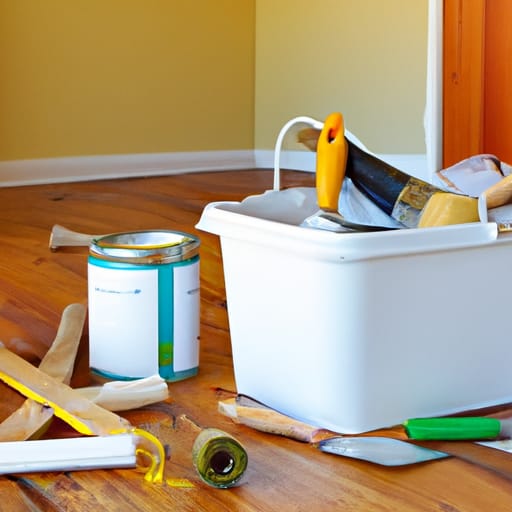Finding a balance between DIY and professional help can be a tricky task. On one hand, the satisfaction and cost-effectiveness of DIY endeavors can be appealing, but on the other hand, certain tasks may require the expertise and guidance of professionals. It’s crucial to navigate this balance wisely, considering factors like skill level, available resources, time constraints, and potential risks. In this article, we will explore practical tips and insights to help you strike the right balance between doing it yourself and seeking professional assistance, ensuring you make the best decisions for your specific needs and goals.

Understanding the DIY vs Professional Help Dilemma
When it comes to tackling tasks and projects around the house, the decision between doing it yourself (DIY) or seeking professional help can be a difficult one. Both options have their own set of advantages and disadvantages, and finding the right balance is crucial. In this article, we will explore the importance of striking a balance between the two and discuss the factors that should be considered when making this decision.
Importance of striking a balance
Striking a balance between DIY and professional help is crucial for several reasons. First and foremost, it allows you to make the most of your skills and expertise while also considering the complexity and risks involved in a task. It ensures that you are making an informed decision based on factors such as cost, time, and potential consequences. Additionally, finding a balance allows you to take advantage of the benefits that both DIY and professional help have to offer, ultimately leading to successful outcomes.
Factors to Consider when Finding A Balance Between DIY And Professional Help.
When faced with a task or project, there are several factors that you should consider before deciding whether to tackle it yourself or seek professional help. These factors include the complexity of the task, your own skills and knowledge, the financial implications, the value of professional expertise, the importance of time, the risks involved, and seeking professional recommendations. Let’s explore each of these factors in more detail.
Assessing the Complexity of the Task
Before deciding whether to take on a task yourself or seek professional help, it’s important to assess its complexity. Some tasks may require a level of expertise beyond what you possess, or they may involve potential risks and consequences that you are not equipped to handle. Evaluating the complexity of the task will help you determine if it falls within your capabilities or if it’s best left to professionals.
Determining the level of expertise required
When assessing the complexity of a task, consider the level of expertise required to complete it successfully. Ask yourself if you have the necessary skills, knowledge, and experience to do the job effectively and efficiently. If the task involves specialized techniques or equipment that you are unfamiliar with, it may be wise to seek professional help.
Evaluating the potential risks and consequences
Another important aspect to consider when assessing the complexity of a task is the potential risks and consequences involved. Some tasks, such as electrical work or plumbing repairs, can pose serious safety hazards if not done correctly. Additionally, certain projects may have long-term consequences, such as structural damage if not executed properly. Evaluating the potential risks and consequences will help you determine if the task is worth the potential dangers and if professional help should be sought.
Considering the time and effort involved
Time and effort are valuable resources, and it’s important to consider them before committing to a task. Some projects may require a significant amount of time and effort to complete, which can take away from other important aspects of your life. Assess your availability and schedule to determine if you have the time and energy to devote to the task. If not, it may be more beneficial to seek professional help and save yourself the stress and inconvenience.
Evaluating Your Skills and Knowledge
Understanding your own skills and knowledge is essential when deciding between DIY and professional help. Recognizing your strengths and limitations will allow you to make an honest assessment of whether you are capable of successfully completing the task. It’s important to be realistic about your abilities and avoid taking on projects that are beyond your skill set.
Identifying your strengths and limitations
Take the time to identify your strengths and limitations in relation to the task at hand. Consider your past experiences and successes, as well as areas where you may lack expertise. By acknowledging your strengths, you will gain confidence in your abilities and be better equipped to assess whether the task is suitable for DIY or if professional help is required.
Understanding the learning curve
Some tasks may require you to acquire new skills and knowledge in order to be completed effectively. It’s important to understand the learning curve associated with the task and assess whether you are willing and able to invest the time and effort required to acquire the necessary expertise. Keep in mind that while DIY can be a learning opportunity, it may not always be worth the investment if the task is complex or time-sensitive.

Researching resources and tutorials
If you decide to take on a task yourself, it’s important to research available resources and tutorials that can help you along the way. The internet is a valuable tool that provides access to a wealth of information and instructional videos. Ensure that you have access to reliable resources and take the time to familiarize yourself with the process before starting the task. Proper research and preparation can increase your chances of success when undertaking a DIY project.
Considering the Cost Factor
Cost is an important consideration when deciding between DIY and professional help. While DIY projects often appear to be more cost-effective at first glance, it’s essential to carefully compare the financial implications of both options. Consider not only the direct costs associated with materials and tools but also the potential long-term financial impact of any mistakes or damage that may occur during the DIY process.
Comparing the financial implications
When comparing the financial implications of DIY and professional help, consider the cost of materials, tools, and any other resources required for the task. Factor in the time and effort you will need to invest, as well as any potential expenses that could arise if mistakes are made. On the other hand, professional help may come with a higher upfront cost but can potentially save you money in the long run by ensuring the job is done right the first time.
Factoring in the cost of tools and materials
Many DIY projects require the use of specialized tools and materials that you may not already have on hand. It’s important to factor in the cost of acquiring these items when considering a DIY project. Consider whether it would be more cost-effective to invest in the tools and materials or to hire a professional who already possesses them. This will help you make an informed decision based on your budget and needs.
Assessing the long-term financial impact
When assessing the long-term financial impact, consider the potential consequences of mistakes or damage that may occur during a DIY project. If a task is complex and involves high stakes, such as home renovations or electrical work, any errors could result in expensive repairs or even pose a risk to your safety. In such cases, it may be more prudent to invest in professional help to avoid long-term financial implications.
Assessing the Value of Professional Expertise
One of the key advantages of seeking professional help is access to their expertise and experience. Professional service providers have undergone extensive training and have the necessary skills to complete tasks efficiently and effectively. Consider the value of professional expertise when making a decision between DIY and professional help.
Recognizing the benefits of professional experience
Professional experience can be invaluable when it comes to complex tasks or projects that require a high level of precision. Professionals have a deep understanding of their respective fields and can provide insights and solutions that may not be readily available to those without their expertise. By acknowledging the benefits of professional experience, you can make an informed decision about whether to enlist their help.
Considering the guarantee or warranty provided
Another advantage of professional help is the guarantee or warranty that they often provide. Many professionals offer warranties on their work, ensuring that any issues or problems that arise after the completion of the task will be addressed at no additional cost. This can provide peace of mind and financial protection, especially for tasks that involve expensive materials or equipment.
Weighing the reliability and quality of work
Reliability and quality of work are important considerations when assessing the value of professional expertise. Professionals are often held to high standards and are accountable for their work. By hiring a professional, you can expect a certain level of professionalism, reliability, and quality. This can be particularly important for tasks that require strict adherence to regulations and standards, such as electrical work or plumbing installations.
Determining the Importance of Time
Time is a finite resource, and its management is crucial when deciding between DIY and professional help. Assessing your availability and schedule, as well as considering the urgency of the task, will help you determine the importance of time in your decision-making process.
Assessing your availability and schedule
Consider your current commitments and availability when deciding whether to tackle a task yourself or seek professional help. DIY projects often require a significant time investment, and if you have limited availability or pressing deadlines, it may be more efficient to delegate the task to professionals. Assess your schedule and determine if you can realistically devote the necessary time to complete the task to a satisfactory standard.
Considering the urgency of the task
The urgency of the task is an important factor to consider when determining the importance of time. Some tasks may require immediate attention, such as a leaking pipe or a malfunctioning electrical system. In such cases, it may not be feasible to wait for a DIY project to be completed, especially if you lack the necessary skills or experience. Professional help can ensure a swift resolution, reducing the impact on your daily life or preventing further damage.
Weighing the impact on your personal or professional life
When evaluating the importance of time, consider the impact that taking on a task yourself may have on your personal or professional life. DIY projects can be time-consuming and demanding, potentially requiring you to sacrifice leisure time or time spent with loved ones. Assess whether the task is worth the potential disruption and whether you have the capacity to manage it alongside your other responsibilities.
Evaluating the Risks Involved
Every task comes with its own set of risks, and it’s essential to evaluate them before deciding between DIY and professional help. Understanding potential safety hazards, assessing the potential for mistakes or damage, and evaluating the impact on your health or well-being will help you make an informed decision based on the level of risk involved.
Understanding potential safety hazards
Certain tasks, such as electrical work or working with hazardous materials, can pose significant safety hazards if not handled properly. It’s crucial to have a clear understanding of the potential risks involved and assess whether you have the knowledge and skills to mitigate them. If the risks are beyond your capabilities or the consequences of an accident could be severe, it may be wiser to seek professional help.
Assessing the potential for mistakes or damage
No matter how skilled you may be, mistakes can happen, and damage can occur during a DIY project. Before deciding to tackle a task yourself, evaluate the potential for mistakes or the likelihood of causing damage. If the consequences of errors or damage are high or could lead to costly repairs, it may be safer and more cost-effective to enlist the help of professionals.
Evaluating the impact on your health or well-being
Your health and well-being should always be a top priority when considering DIY projects. Assess whether the task involves physical exertion, exposure to harmful substances, or poses any risks to your well-being. If the task could potentially have a negative impact on your health or if you have any pre-existing conditions that could be exacerbated, it’s important to seriously consider seeking professional help.
Seeking Professional Recommendations
Seeking advice from experts in the field and gathering recommendations from trusted sources can provide valuable insights and guidance when making the decision between DIY and professional help.
Seeking advice from experts in the field
If you are unsure about the best course of action for a particular task, it’s always a good idea to seek advice from experts in the relevant field. Professionals or specialists can provide valuable insights, answer questions, and help you gain a better understanding of the complexity and risks involved. Consulting with experts can empower you to make an informed decision that takes into account professional opinions and advice.
Asking for referrals from trusted sources
One of the most effective ways to find reliable professionals is through referrals from trusted sources. Reach out to friends, family members, neighbors, or colleagues who have had similar tasks or projects completed by professionals. Ask about their experiences, the quality of work, and if they would recommend the professionals they worked with. Gathering referrals helps ensure that you are engaging with reliable and reputable professionals.
Researching reputable professionals or service providers
In addition to seeking recommendations, take the time to research and vet professionals or service providers before making a decision. Look for reputable companies or individuals with a track record of successful projects and satisfied customers. Read reviews, check their credentials and certifications, and verify their reliability and professionalism. Thorough research will give you confidence in your decision and help you find the right professional for the job.
Considering DIY as a Learning Opportunity
One of the benefits of DIY projects is the opportunity to build new skills and knowledge. By taking on tasks yourself, you can gain a sense of accomplishment and expand your capabilities. However, it’s important to recognize the limits of your abilities and embrace DIY projects as learning experiences.
Building new skills and knowledge
DIY projects provide an excellent opportunity to acquire new skills and knowledge. As you tackle different tasks, you can develop expertise in areas that were previously unfamiliar to you. Building these new skills not only empowers you to handle future tasks more confidently but also increases your overall self-sufficiency and can be a source of personal growth and fulfillment.
Gaining a sense of accomplishment
Completing a DIY project can be incredibly rewarding and give you a great sense of accomplishment. By taking matters into your own hands and successfully completing a task, you can boost your self-confidence and feel a sense of pride in your abilities. The satisfaction derived from a job well done can be a powerful motivator to take on future DIY projects and explore new areas of interest.
Understanding the limits of your abilities
While DIY projects offer opportunities for growth and learning, it’s essential to be realistic about the limits of your abilities. Recognize when a task exceeds your current skill set or requires expertise that is beyond your reach. Acknowledging your limitations is not a sign of weakness but rather a wise decision that ensures the task is completed safely and to a high standard.
Finding a Middle Ground
In some cases, finding a middle ground between DIY and professional help can be the best solution. Partial DIY and professional collaboration can take advantage of your capabilities while also benefiting from professional expertise. By carefully determining which tasks are suitable for DIY and those that are best left to professionals, you can strike a balance that maximizes efficiency, quality, and cost-effectiveness.
Considering partial DIY and professional collaboration
Partial DIY and professional collaboration allow you to take on certain aspects of a project yourself while seeking professional assistance for more specialized or complex tasks. This approach can help you leverage your skills and knowledge while benefiting from the experience and expertise of professionals. It allows you to make the most of your abilities while also ensuring that the project is completed to a high standard.
Determining tasks suitable for DIY and those best left to professionals
To determine which tasks are suitable for DIY and which are best left to professionals, assess the complexity, risks, and time required for each task. Tasks that are well within your capabilities, pose minimal risks, and can be completed within your available time frame are generally suitable for DIY. Conversely, tasks that require specialized equipment or techniques, involve safety hazards, or have stringent regulations may be better suited for professional help.
Seeking advice from professionals for DIY projects
Even when embarking on DIY projects, seeking advice from professionals can be immensely helpful. Consulting with professionals can provide guidance, recommendations, and insights that can enhance the quality and efficiency of your DIY endeavors. Their expertise can help you navigate potential pitfalls, avoid common mistakes, and ensure that your project is on the right track.
In conclusion, finding a balance between DIY and professional help is essential for successful outcomes. By carefully considering the complexity of the task, evaluating your skills and knowledge, assessing the cost, time, and risks involved, and seeking professional recommendations, you can make informed decisions that maximize efficiency, quality, and satisfaction. DIY projects can be rewarding learning experiences, but it’s important to recognize the limits of your abilities and embrace professional help when necessary. By finding a middle ground that combines your capabilities with professional expertise, you can achieve the best of both worlds and complete projects with confidence.













